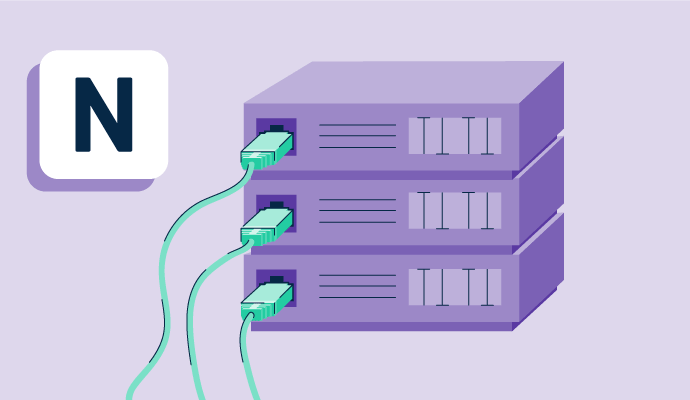What is network attached storage?
Network attached storage (NAS) is a device used to store and share data. Instead of attaching to a computer, NAS connects to a local network to provide centralized storage.
Since they are network-dependent instead of hardware-dependent, NAS devices can be accessed by various computers, devices, and people. In addition to this flexibility, companies like to use NAS to store their most used documents since files can be retrieved quickly.
Network attached storage can help a growing business expand file storage and back up important files in a single, accessible location. Connected via the network, NAS also offers a viable solution for companies with remote workers.
Basic elements of network attached storage
NAS has many different individual parts that are separated into four main categories. These essential components are:
- Storage: The outer unit, which is often referred to as the NAS box or head, comprises two to five storage drives. The standard hard drive is 3.5 inches and boasts a variety of storage capacities.
- Networking: True to its name, NAS has to connect to a network. Users can set up via Ethernet ports or connect via WiFi. A NAS device comes with at least one network interface card (NIC) to facilitate this connection.
- Processor: A central processing unit (CPU), the core of the appliance, is necessary for computing, speed, and functionality. The CPU gives the NAS the power to manage the entire file system.
- Operating System (OS): The OS helps run the built-in software, as well as the collaboration and productivity apps.
Benefits of network attached storage
In a digitized world, businesses are leaning more toward centralized file storage and sharing solutions. NAS offers a variety of advantages for small start-ups to large enterprises, including:
- Quick setup: NAS devices are designed to be easy to use. That means even smaller companies without a tech department should have no trouble setting one up. With a web-based interface, the product provides painless operation.
- Affordability: Offering data storage and backup, NAS provides arguably more value than some other solutions. A business can purchase a NAS device at a wide range of price points depending on its features and storage needs.
- Peace of mind: NAS users know they won’t run out of storage for their most valuable files. Moreover, users feel at ease because their data is securely backed up in an extra location.
Network attached storage best practices
Certain best practices apply whether an organization has a whole team of devoted IT professionals or a single employee backing up files. For best results, follow these tips:
- Use strong passwords. As with other types of technology, NAS is susceptible to hacking and malware attacks. Strong passwords or multi-factor authentication can keep accounts safe. It’s also important to change the default administrator account’s username and password immediately upon installation.
- Close ports and secure connections. On the NAS head, change the default ports and close all ports that are not connected. Also, use https instead of http to encrypt data sent over the web.
- Use a VPN. If possible, use a virtual private network (VPN) when connecting to the NAS to keep it even safer. The VPN allows for another layer of encryption and keeps IP addresses anonymous.
- Engage firewalls. NAS comes with firewalls, which work well to prevent cyberattacks. Some devices might require users to manually configure firewall settings, so make this a priority when setting up the system.
- Update firmware regularly. Firmware updates provide fixes to patch vulnerabilities in the system. Users should receive notifications when these updates are available. Don’t delay in installing them.
Network attached storage vs. storage area network
These two terms are often confused because they generally have a similar purpose. Both are technology-based solutions designed to store data and share it with multiple users.
NAS stores data in a single, centralized device and shares it through an Ethernet connection. Storage area network (SAN) is a more complex network of storage devices based on Fiber Channel for enterprises or Ethernet connections for small to medium organizations.
NAS is typically valued for its ease of use and lower cost, while SAN is prized for its powerful performance and high speed.

Kelly Fiorini
Kelly Fiorini is a freelance writer for G2. After ten years as a teacher, Kelly now creates content for mostly B2B SaaS clients. In her free time, she’s usually reading, spilling coffee, walking her dogs, and trying to keep her plants alive. Kelly received her Bachelor of Arts in English from the University of Notre Dame and her Master of Arts in Teaching from the University of Louisville.

